Context: Turkey’s conflict with the Kurdistan Workers’ Party (PKK) – recognised as a terrorist organisation by Turkey, the U.S. and the EU – continues in south-eastern Turkey and northern Iraq. In northern Syria, Ankara and the PKK’s Syrian affiliate, the People’s Protection Forces (YPG), remain pitted against each other. On the home front, the government is pursuing crackdown on the pro-Kurdish Peoples’ Democratic Party (HDP).
Battleground: In May, escalation continued in Turkey’s south east and northern Iraq. Turkish air raids targeting PKK militants and positions in northern Iraq intensified after PKK on 14 May reportedly attacked Turkish base in Iraq’s Dahuk province. A Turkish air raid targeted PKK positions in Sulaymaniyah province 27 May. Two civilian aid workers in Van’s Özalp district in Turkey’s east were killed in PKK attributed attack on 14 May. Three out of five Turkish security force member fatalities in this period occurred in Hakkari’s Çukurca district.
Analysis: Prospects for non-violent ways forward look bleak amid uncertainty in Syria and the Turkish political leadership’s reliance on support from nationalists at home.
In July 2015, a two-and-a-half year long ceasefire broke down, and the almost four-decade long conflict between Turkish security forces and militants of the Kurdistan Workers’ Party (PKK) – recognised as a terrorist organisation by Turkey, the U.S. and the EU – entered one of its deadliest chapters in nearly four decades.
Since that date, violence has devastated communities in Turkey’s majority-Kurdish south east and – at times – struck into the heart of the country’s largest metropolitan centres. An unprecedented flare-up of fighting and attacks in some south-eastern urban districts in the first half of 2016, was followed by a gradual shift of violence into rural areas.
International Crisis Group has assembled a database of fatalities caused by this conflict since 2011. Our data is based on information available in open sources, including reports from Turkish language media, the Turkish military, local Kurdish rights groups, and the PKK itself. This platform presents some of the information that can be gleaned from this data. For our latest detailed analysis that also draws on this data, click here.
According to Crisis Group’s fatality tally, last updated on 3 June 2020,
AT LEAST
4,906 people
have been killed in clashes or terror attacks since 20 July 2015. This includes:
499 CIVILIANS
Confirmed by Crisis Group as non-combatants, the overwhelming majority of these individuals have been killed in urban clashes in the south east or in PKK bomb attacks in metropolitan centres. (Crisis Group includes only named fatalities confirmed through its open-source methodology).
1,238 STATE SECURITY FORCE MEMBERS
Fatalities include soldiers, police officers and village guards (paramilitary groups comprised of ethnic Kurds, armed and paid by the Turkish state). For a detailed breakdown of state security force fatalities, see below.
226 INDIVIDUALS OF UNKNOWN AFFILIATION
Individuals aged 16-35 killed in areas of clashes, overwhelmingly in urban curfew zones who cannot be confirmed as either civilians or combatants. These individuals cannot be positively identified as civilians or members of plainclothes PKK youth militias due to the blurred line between civilian and militant in an urban conflict setting.
2,943 PKK MILITANTS
Members of the PKK and affiliates active in Turkey. Crisis Group assumes that total PKK fatalities are higher than this public tally. Ankara says that more than ten thousand militants have been “neutralised” (either killed, captured or surrendered) since the resumption of hostilities in July 2015. Crisis Group figures should not be seen as a refutation of fatality claims made by the Turkish government.
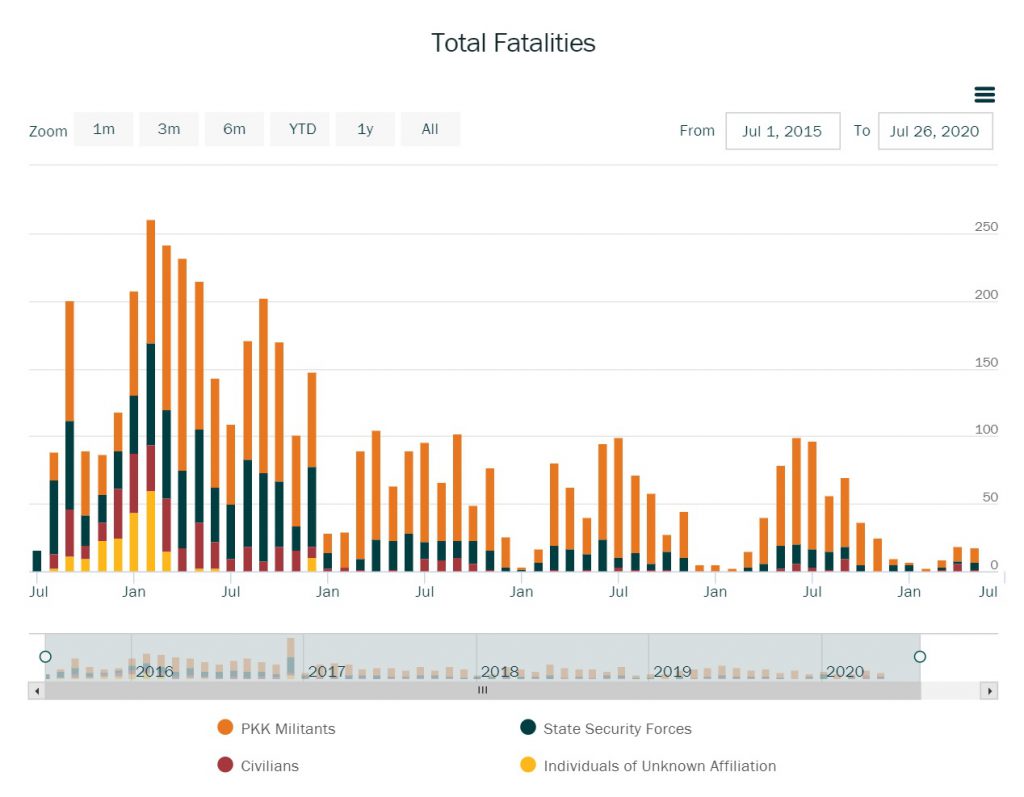
The fatality rate in Turkey’s PKK conflict peaked in the winter of 2015/2016. At this time, the conflict was concentrated in a number of majority-Kurdish urban districts in Turkey’s south east. In these districts, PKK-backed youth militias had erected barricades and trenches to claim control of territory. Turkish security forces reestablished control in these urban centres in June 2016.
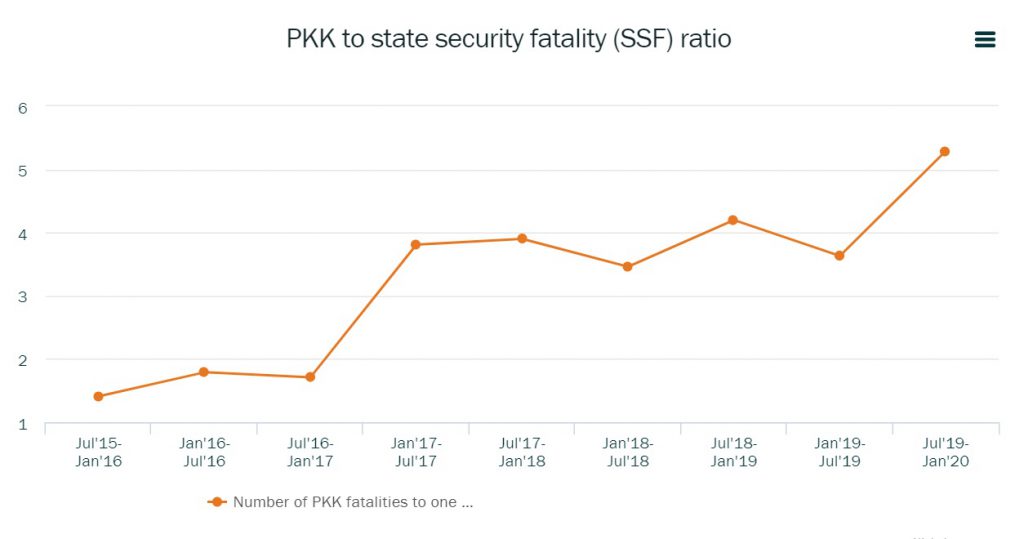
The state security force-to-PKK militant fatality ratio is a good indicator of the changing power balance in the battlefield. The rate of PKK militants killed per one state security force member saw an almost four-fold increase since July 2015.
Mapping Fatalities and Hometowns
While fatalities since July 2015 remained largely confined to provinces in Turkey’s south east, the hometowns of security force and PKK militant deaths illustrate the conflict’s broader impact on communities around Turkey.
Hometowns Map
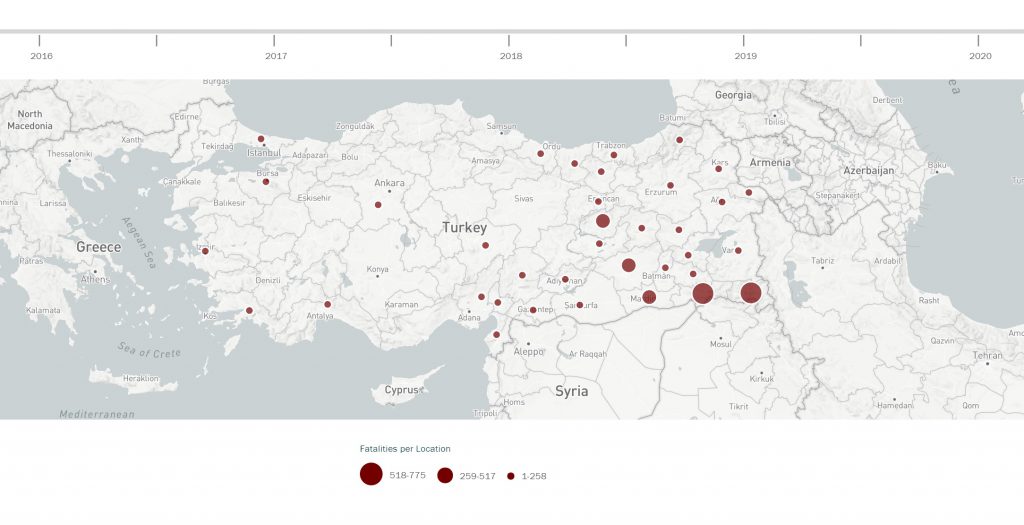
Breakdown by Fatality Categories
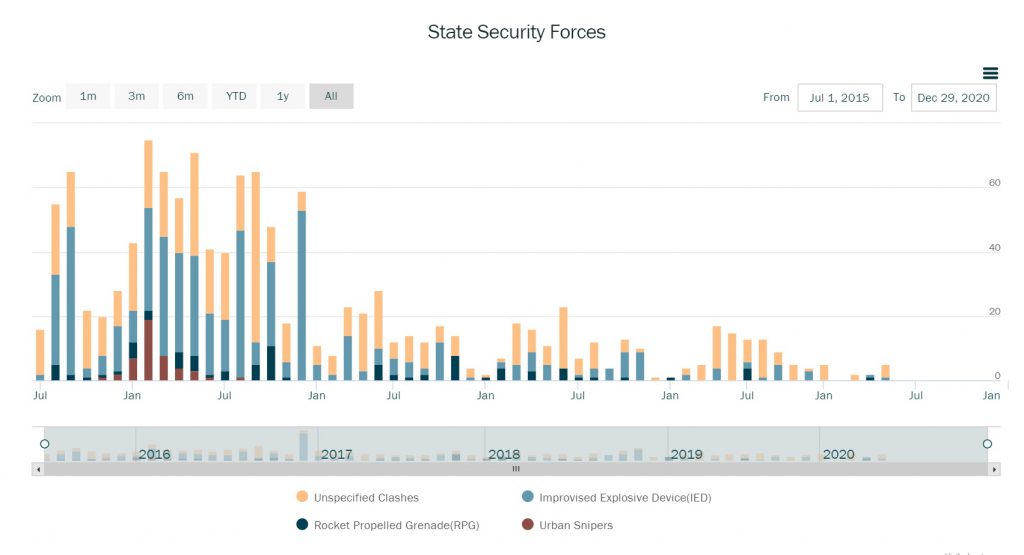
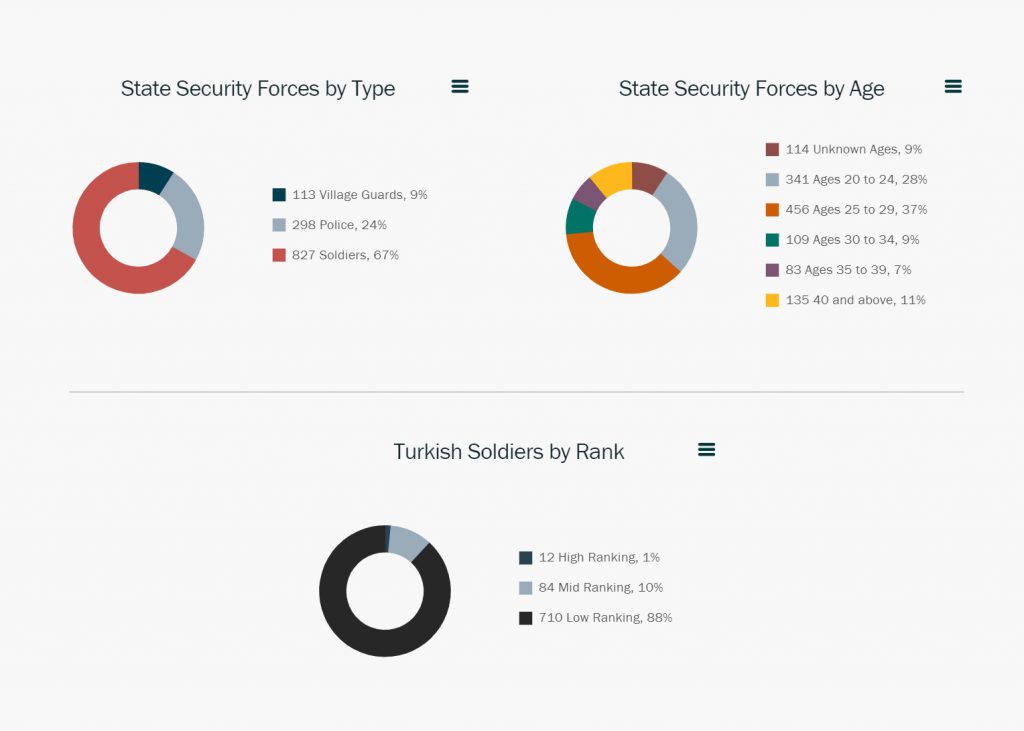
Since July 2015, militant attacks and clashes with the PKK have killed at least 1,238 security force members, including 827 soldiers, 298 police officers, and 113 village guards (paramilitaries comprised by ethnic Kurds armed and funded by the Turkish state).
Improvised explosive devices (IEDs) have killed 528 of all state security force members since the end of the ceasefire. An additional 46 were killed by urban snipers, while 93 were killed in attacks involving rocket propelled grenades. All other deaths occurred during militant attacks or clashes which were not described in detail in media reports or official military announcements.
The average age of members of the state security forces killed since July 2015 is 29. 99 per cent of security force fatalities were male.
Changing Theatre of Conflict
Following an unprecedented flare-up in south-eastern urban districts toward the end of 2015 and in the first half of 2016, the conflict gradually moved into rural areas. Prior to the 2015 outbreak, this is where fighting has been most concentrated.
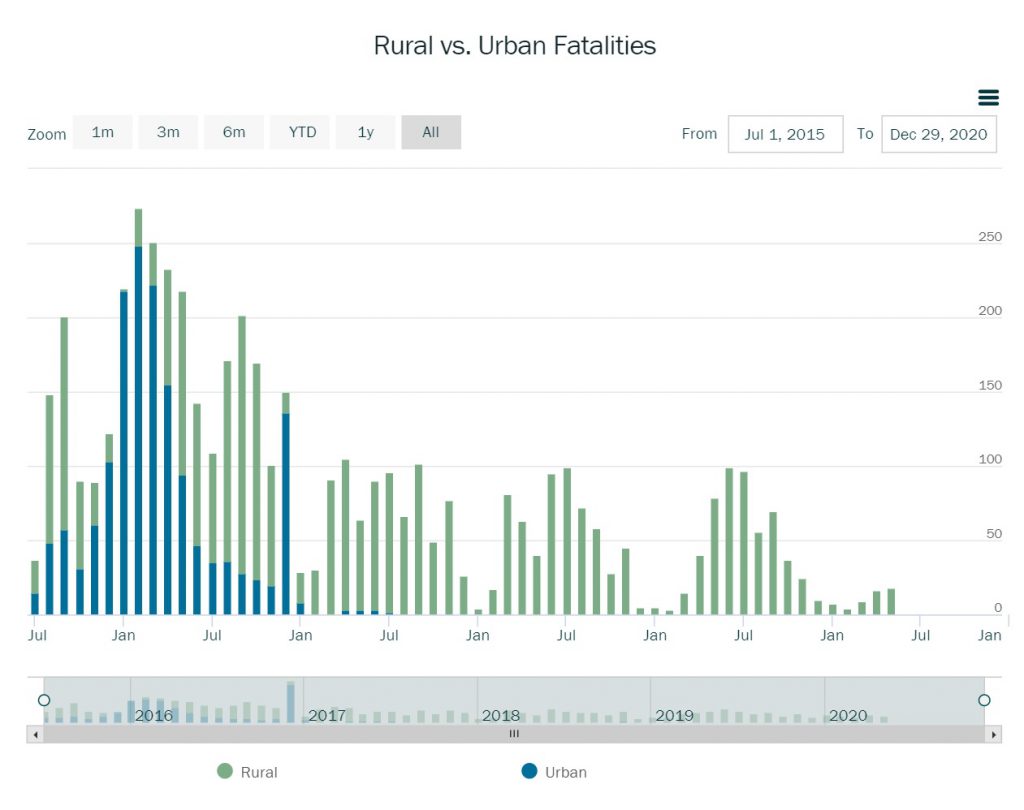
Fatalities before 2015
Crisis Group has recorded fatalities since 2011. Our tally shows that scattered violence continued throughout March 2013 and July 2015. During this time, the PKK had declared a unilateral ceasefire and the Turkish government was in talks with the PKK in what Ankara called a “resolution process”.
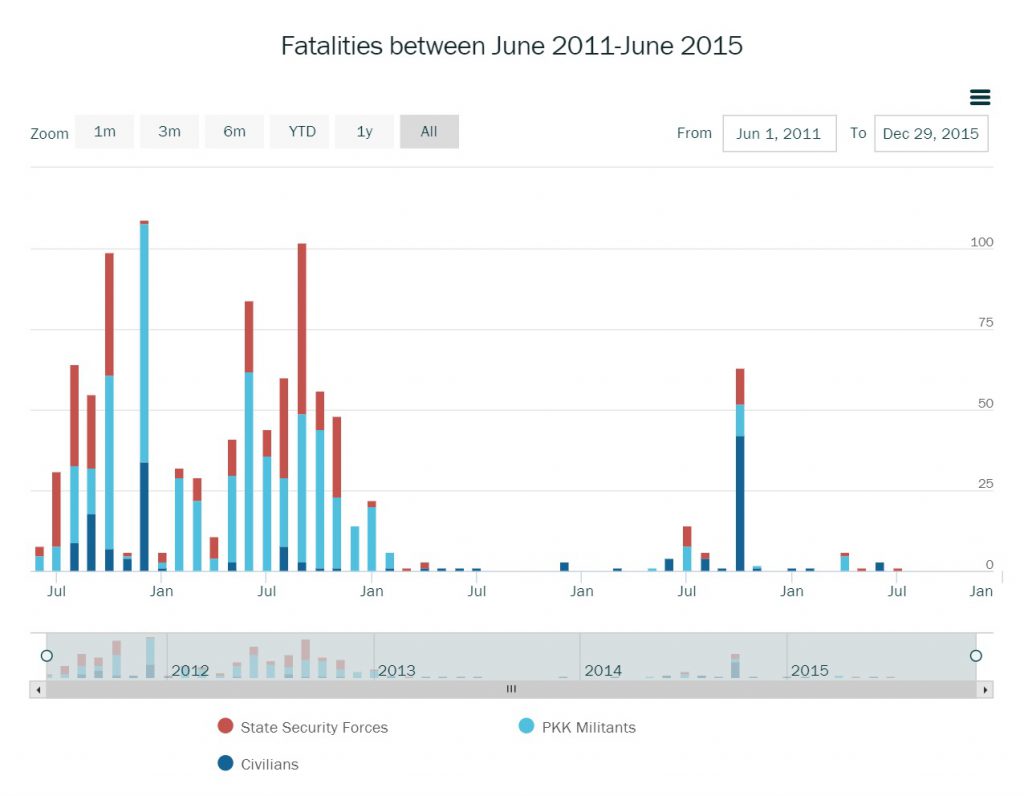
 Eurasia Press & News
Eurasia Press & News



